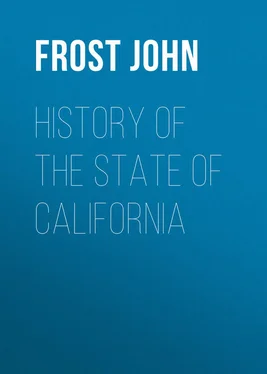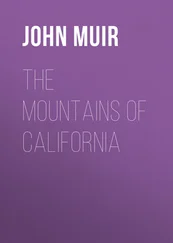John Frost - History of the State of California
Здесь есть возможность читать онлайн «John Frost - History of the State of California» — ознакомительный отрывок электронной книги совершенно бесплатно, а после прочтения отрывка купить полную версию. В некоторых случаях можно слушать аудио, скачать через торрент в формате fb2 и присутствует краткое содержание. Жанр: История, foreign_antique, foreign_prose, на английском языке. Описание произведения, (предисловие) а так же отзывы посетителей доступны на портале библиотеки ЛибКат.
- Название:History of the State of California
- Автор:
- Жанр:
- Год:неизвестен
- ISBN:нет данных
- Рейтинг книги:3 / 5. Голосов: 1
-
Избранное:Добавить в избранное
- Отзывы:
-
Ваша оценка:
- 60
- 1
- 2
- 3
- 4
- 5
History of the State of California: краткое содержание, описание и аннотация
Предлагаем к чтению аннотацию, описание, краткое содержание или предисловие (зависит от того, что написал сам автор книги «History of the State of California»). Если вы не нашли необходимую информацию о книге — напишите в комментариях, мы постараемся отыскать её.
History of the State of California — читать онлайн ознакомительный отрывок
Ниже представлен текст книги, разбитый по страницам. Система сохранения места последней прочитанной страницы, позволяет с удобством читать онлайн бесплатно книгу «History of the State of California», без необходимости каждый раз заново искать на чём Вы остановились. Поставьте закладку, и сможете в любой момент перейти на страницу, на которой закончили чтение.
Интервал:
Закладка:
The Californian , published at San Francisco on the 14th of August, furnishes the following interesting account of the Gold Region:
"It was our intention to present our readers with a description of the extensive gold, silver, and iron mines, recently discovered in the Sierra Nevada, together with some other important items, for the good of the people, but we are compelled to defer it for a future number. Our prices current, many valuable communications, our marine journal, and other important matters, have also been crowded out. But to enable our distant readers to draw some idea of the extent of the gold mine, we will confine our remarks to a few facts. The country from the Ajuba to the San Joaquin rivers, a distance of about one hundred and twenty miles, and from the base toward the summit of the mountains, as far as Snow Hill, about seventy miles, has been explored, and gold found on every part. There are now probably 3000 people, including Indians, engaged collecting gold. The amount collected by each man who works, ranges from $10 to $350 per day. The publisher of this paper, while on a tour alone to the mining district, collected, with the aid of a shovel, pick and tin pan, about twenty inches in diameter, from $44 to $128 a day – averaging $100. The gross amount collected will probably exceed $600,000, of which amount our merchants have received about $250,000 worth for goods sold; all within the short space of eight weeks. The largest piece of gold known to be found weighed four pounds.
"Labor has ever been high in California, but previous to the discovery of the placera gold, the rates ranged from $1 to $3 per day. Since that epoch common labor cannot be obtained, and if to be had, for no less price than fifty cents per hour, and that the most common. Carpenters and other mechanics have been offered $15 a day, but it has been flatly refused. Many of our enterprising citizens were largely engaged in building, and others wish to commence on dwellings, warehouses, and the like, but all have had to suspend for the lack of that all important class of community, the working men."
The following extracts from the published journal of a physician in California, give accounts of the reception of the news of the gold discovery in San Francisco, with its consequent effects.
" May 8th. – Captain Fulsom called at Sweeting's to-day. He had seen a man this morning, who reported that he had just come from a river called the American Fork, about one hundred miles in the interior, where he had been gold washing. Captain Fulsom saw the gold he had with him; it was about twenty-three ounces weight, and in small flakes. The man stated that he was eight days getting it, but Captain Fulsom hardly believed this. He says that he saw some of this gold a few weeks since, and thought it was only 'mica,' but good judges have pronounced it to be genuine metal. He talks, however, of paying a visit to the place where it is reported to come from. After he was gone, Bradley stated that the Sacramento settlements, which Malcolm wished to visit, were in the neighborhood of the American Fork, and that we might go there together; he thought the distance was only one hundred and twenty miles.
" May 10th. – Yesterday and to-day nothing has been talked of but the new gold 'placer,' as people call it. It seems that four other men had accompanied the person Captain Fulsom saw yesterday, and that they had each realized a large quantity of gold. They left the 'diggings' on the American Fork, (which it seems is the Rio de los Americanos, a tributary to the Sacramento) about a week ago, and stopped a day or two at Sutter's Fort, a few miles this side of the diggings, on their way; from there they had travelled by boat to San Francisco. The gold they brought has been examined by the first Alcalde here and by all the merchants in the place. Bradley showed us a lump weighing a quarter of an ounce, which he had bought of one of the men, and for which he gave him three dollars and a half. I have no doubt in my own mind about its being genuine gold. Several parties, we hear, are already made up to visit the diggings; and, according to the newspaper here, a number of people have actually started off with shovels, mattocks, and pans, to dig the gold themselves. It is not likely, however, that this will be allowed, for Captain Fulsom has already written to Colonel Mason about taking possession of the mine on behalf of the government, it being, as he says, on public land.
" May 17th. – This place is now in a perfect furor of excitement; all the work-people have struck. Walking through the town to-day, I observed that laborers were employed only upon about half-a-dozen of the fifty new buildings which were in the course of being run up. The majority of the mechanics at this place are making preparations for moving off to the mines, and several hundred people of all classes – lawyers, store-keepers, merchants, &c., – are bitten with the fever; in fact, there is a regular gold mania springing up. I counted no less than eighteen houses which were closed, the owners having left."
The mania continued to increase, and within a few months all the principal towns were nearly emptied of their population. Gold was the universal object, and splendid and rapid fortune the universal hope. No occupation seemed to offer such a prospect as that of digging gold, and, accordingly, those who were not able to bear the fatigues of such work, or were at the head of any sort of business in the different towns, had to pay enormous prices for the labor of subordinates who performed the meanest services. The prices of all agricultural and manufactured products became treble the previous rates.
Soon came the first waves of the tide of emigration that was to flood the placers of the gold region. The first influx consisted of Mexicans of the province of Sonoma, Chilians, and some few Chinese. These, principally took possession of the southern mines, or those on the San Joaquin and its tributaries. Some few stopped at San Francisco, and secured lots of ground which they knew would become very valuable in a short time, and erected temporary stores and dwellings. This gave the impulse to the progress of the town, and it soon advanced rapidly in size and population. Then came the emigration from the Atlantic States of the Union, and the whole territory felt the progressive and enterprising spirit of the gold-seekers. The Americans generally took possession of the mines upon the northern tributaries of the Sacramento River; but as their numbers increased they pushed towards the southern mines, and frequent collisions with the foreigners were the consequence. Finally, a great number of the latter were compelled to leave the country.
CHAPTER VII
The adventures of the eager gold-seekers in the region of their hopes, among the washings and the diggings of the placers , cannot but be interesting. The toil to which the men have to submit if they would obtain any thing like a satisfaction to their desires, is of a very irksome character. In the summer season, the heat is intense, and the principal part of the labor of washing and digging must be performed exposed to the full blaze of the sun. In the "dry diggings," the miners suffer greatly from the want of water. Most of the provisions having to be transported from the towns on the Sacramento and San Joaquin, soon grow unwholesome from exposure to the sultry air of the day and the damp air of the night. This diet, conjointly with the exposure of the miners, tends to produce intermittent fever and dysentery. The miners generally reside in huts of a rude construction, or in canvas tents, which afford but poor protection from the changes of the weather.
Читать дальшеИнтервал:
Закладка:
Похожие книги на «History of the State of California»
Представляем Вашему вниманию похожие книги на «History of the State of California» списком для выбора. Мы отобрали схожую по названию и смыслу литературу в надежде предоставить читателям больше вариантов отыскать новые, интересные, ещё непрочитанные произведения.
Обсуждение, отзывы о книге «History of the State of California» и просто собственные мнения читателей. Оставьте ваши комментарии, напишите, что Вы думаете о произведении, его смысле или главных героях. Укажите что конкретно понравилось, а что нет, и почему Вы так считаете.












